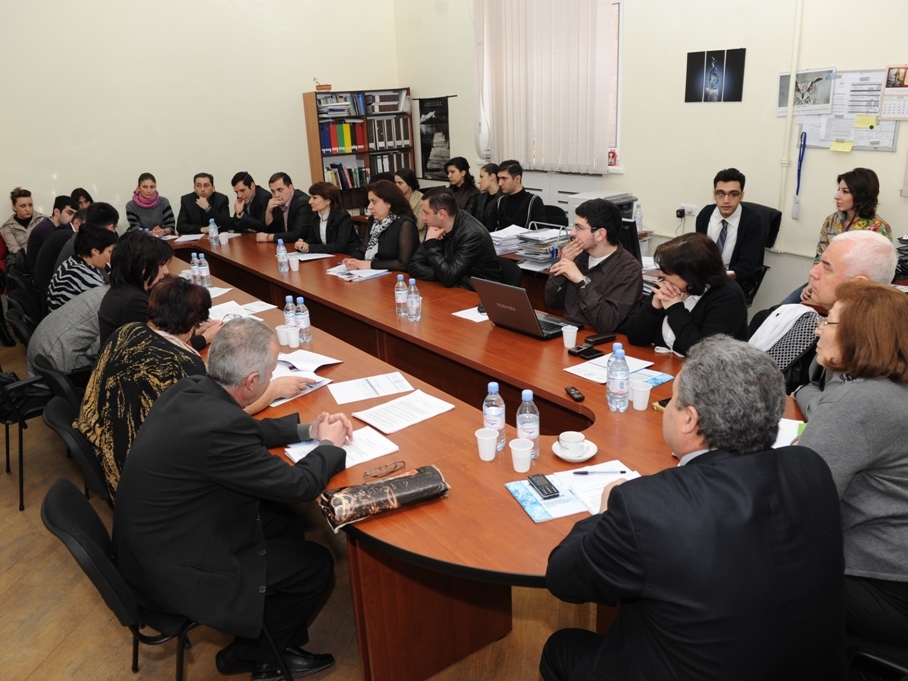 Good Practice: Innovative approach of using a university-based institute as intermediary platform to conduct public consultation on GMOs in Armenia.
Good Practice: Innovative approach of using a university-based institute as intermediary platform to conduct public consultation on GMOs in Armenia.
Type: Environmental law research center (ELRC) / Governmental
Working languages: Armenian and Russian
Start: 2012
Duration: 30 days
Number of persons involved: 37 persons
Budget and funding sources: State budget
Partner organizations involved: Ministry of Nature Protection of the Republic of Armenia
Stakeholders involved: Government, academia, NGOs, representatives of media, business sector, students and other. The framework of participants was identified considering ELRC's cooperative organization and the groups that have an interest in law adoption process.
Government: Government of the Republic of Armenia (RA), Ministry of Nature Protection of RA, Ministry of Agriculture of RA, Ministry of Health of RA, State Food Security Service RA.
Academia: Scientists of Yerevan State University (Faculty of Law, Faculty of Biology, Faculty of Geography, Faculty of Chemistry).
NGOs: "For human sustainable development", "Social-ecological association", "Sustainable water environment".
MAIN OBJECTIVES OF THE INITIATIVE
The main objective of the initiative was to provide a platform for the public concerned to express its opinion, remarks, suggestions on the draft law on use of genetically modified organisms. The discussion also aimed to compile different approaches regarding the general principles to be the bulk of the regulation on the GMO use in the Republic of Armenia. Thus to present these approaches to the decision makers in the Parliament of the Republic of Armenia (where the draft has passed the first reading).
METHODOLOGY
The notification on the public consultations was submitted by the Center fifteen days before the consultations by individual note via e-mail and ordinary mail. The participants were also provided with the draft law and its review, as prepared by the Center, in order to ensure their productive participation and raise awareness on the issue that was subject of the discussion. One or two days before the hearing, the Center notified once more the stakeholders and confirmed their participation by making individual calls. The press release of the hearing was disseminated through the Public relations and information administration of the Yerevan State University and several posts were made on social networks (e.g. http://www.facebook.com/pages/Environmental-law-research-centerYSU-Faculty-of-Law/180656148676231).
RESULTS AND EVALUATION OF THE INITIATIVE
Results:
The result of the consultations were key recommendations and remarks on the draft adopted with consent of the participants and were submitted to authorities by the Center.
Strengths, good practices and lessons learned:
The discrimination of key issues that was submitted to authorities and the submission of the outcome of the public consultation as a joint initiative makes the results more valuable and sustainable from the point of its' consideration in future.
Weaknesses and risks:
The consideration of key remarks and suggestions in the final stage of decision-making (risk). The concentration of the public opinion on the key issues, but not necessarily having the quality of legal technique and regulatory issues (weakness).
Problems/challenges encountered:
The negotiation of interests of various public authorities and the inclusion of non-governmental organization in the dialog with the public authorities.
How the problems/challenges were overcome, and if not, possible suggestions for how they might be overcome in future cases:
Public authorities were granted equal opportunity to express their position in the process of the public hearing. The Center serves as an intermediary institution when organizing and concluding the results of the consultations.
Unresolved issues:
As unresolved issues remain the inclusion of non-governmental organizations and the joint work between NGOs and public authorities on the arising issues.











